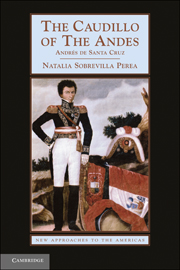Book contents
- Frontmatter
- Contents
- List of Maps and Illustrations
- Timeline for Santa Cruz
- Acknowledgments
- Introduction
- 1 Early Years at the Twilight of the Colonial Period
- 2 Great Marshall of Zepita
- 3 The Creation of Bolivia
- 4 The Genesis of the Peru-Bolivia Confederation
- 5 The Rise and Fall of the Peru-Bolivia Confederation
- 6 Defeat and Exile
- Epilogue: The Long-Term Consequences of the Fall of the Confederation
- Bibliography
- Index
2 - Great Marshall of Zepita
Hero of Independence
Published online by Cambridge University Press: 05 June 2012
- Frontmatter
- Contents
- List of Maps and Illustrations
- Timeline for Santa Cruz
- Acknowledgments
- Introduction
- 1 Early Years at the Twilight of the Colonial Period
- 2 Great Marshall of Zepita
- 3 The Creation of Bolivia
- 4 The Genesis of the Peru-Bolivia Confederation
- 5 The Rise and Fall of the Peru-Bolivia Confederation
- 6 Defeat and Exile
- Epilogue: The Long-Term Consequences of the Fall of the Confederation
- Bibliography
- Index
Summary
Santa Cruz abandoned the royalists and became an important member of the forces that fought for independence. These were heterogeneous, comprising men from places as diverse as the provinces of Buenos Aires, Chile, and northern and central Peru. Among those fighting were many slaves, from both the River Plate and coastal Peru. They had been granted freedom in exchange for joining the army. This chapter explores the new experiences of warfare Santa Cruz gained. These were quite different from what he had seen in the Andes and became even more diverse when he came into contact with the men from northern South America. In the campaign to liberate Quito, he met many who became long-lasting friends and allies. His previous experience of war under the banner of the king stood him in good stead, and in the context of war, he progressed rapidly through the ranks.
During this second act in his military career, he came in contact with Simón Bolívar, the most prominent South American liberator. An extremely charismatic and successful hero and political thinker, Bolívar exerted a lasting influence on Santa Cruz: he became a “bolivarian,” one of the Liberator's closest associates, who, long after his death, endeavored to keep his legacy alive. Under the guidance of Bolívar, Santa Cruz had the opportunity to fight for independence and was responsible for training troops and commanding them successfully in battle. Like his previous experience in Upper Peru, this was formative and influential during his later career.
- Type
- Chapter
- Information
- The Caudillo of the AndesAndrés de Santa Cruz, pp. 53 - 83Publisher: Cambridge University PressPrint publication year: 2011

